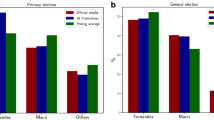Abstract
This paper finds that the relatively favorable standing of Ronald Reagan in the preelection polls helped to generate a bandwagon effect in the 1980 presidential election. The models tested here suggest that this effect was most pronounced among voters who had the weakest prior political opinions and hence were most susceptible to suggestion through the media. While the bandwagon effect that is generated is modest, after controlling for an array of other political biases, it is substantial enough to warrant further attention as the dissemination of poll results becomes an increasingly attractive news “event.”
Article PDF
Similar content being viewed by others
Avoid common mistakes on your manuscript.
References
Atkin, Charles, and Heald, Gary (1976). The effects of political advertising.Public Opinion Quarterly 40: 216–228.
Bartels, Larry M. (1985). Expectations and preferences in presidential nominating campaigns.American Political Science Review 79: 804–815.
Behr, Ray L., and Iyengar, Shanto (1985). Television news, real world cues and changes in the public agenda.Public Opinion Quarterly 49: 38–57.
Berelson, Bernard, Lazarsfeld, Paul, McPhee, William (1954).Voting. Chicago: University of Chicago Press.
Broh, C. Anthony (1983). Polls, pols, and parties.Journal of Politics 45: 732–744.
Brudney, Jeffrey L. (1982). An elite view of the polls.Public Opinion Quarterly 46: 503–520.
Ceci, Stephen J., and Kain, Edward L. (1982). Jumping on the bandwagon with the underdog: the impact of attitude polls on polling behavior.Public Opinion Quarterly 46: 228–242.
Crane, Marie (1982). Perceptions of public opinion. Unpublished Ph.D. dissertation, Dept. of Sociology, University of Michigan.
Downs, Anthony (1957).An Economic Theory of Democracy. New York: Harper & Row.
Erbring, Lutz, Goldenberg, Edie N., and Miller, Arthur H. (1980). Front page news and real world cues: a new look at agenda setting by the media.American Journal of Political Science 24: 16–49.
Iyengar, Shanto, Peters, Mark D., and Kinder, Donald R. (1982). Experimental demonstrations of the not-so-minimal consequences of television news programs.American Political Science Review 76: 848–858.
Latane, Bibb (1981). Psychology of social impact.American Psychologist 36: 343–356.
Marsh, Catherine (1985). Back on the bandwagon: the effect of opinion polls on public opinion.British Journal of Political Science 15: 51–74.
Patterson, Thomas E. (1980).The Mass Media Election. New York: Praeger.
Pindyck, Robert S., and Rubinfeld, Daniel L. (1981).Econometric Models and Economic Forecasts. New York: McGraw-Hill.
Polsby, Nelson W. (1983).Consequences of Party Reform. New York: Oxford University Press.
Polsby, Nelson W., and Wildalvsky, Arron (1980).Presidential Elections (5th. ed.). New York: Scribners.
Riesman, David (1950).The Lonely Crowd. New Haven: Yale University Press.
Stoval, James Glen, and Solomon, Jacqueline H. (1984). The poll as a news event in the 1980 presidential campaign.Public Opinion Quarterly 48: 615–623.
Sudman, Seymour (1983). The Network polls: a critical review.Public Opinion Quarterly 47: 490–496.
Author information
Authors and Affiliations
Rights and permissions
About this article
Cite this article
Skalaban, A. Do the polls affect elections? Some 1980 evidence. Polit Behav 10, 136–150 (1988). https://doi.org/10.1007/BF00991410
Issue date:
DOI: https://doi.org/10.1007/BF00991410




